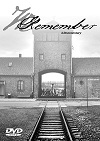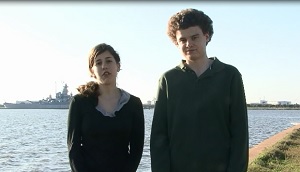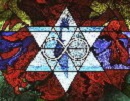PRESS
HOLOCAUST DOCUMENTARY MADE IN MOBILE TO BE SHOWN
AT WWII MUSEUM IN NEW ORLEANS
AL.com, by Carol McPhail, July 1st, 2013

MOBILE, Alabama – "We Remember," a documentary on the Holocaust that includes interviews conducted by two young Mobilians, will be screened this month at the National WWII Museum in New Orleans.

The screening is set for 6 to 7:30 p.m. on Sunday, July 14, at the museum, located at 945 Magazine St.

Victoria Hirsch and Cory Garfunkel, members of the youth group at Springhill Avenue Temple in Mobile, wrote and conducted the interviews for the documentary, which relates the personal experiences of six people during the time of Nazi totalitarianism in the 1930s and 1940s. All six have ties to Mobile.

The film was produced locally by filmmaker Gary Scovill, and Kimberly and Stanley Zimmerman.

Hirsch and Garfunkel will introduce the film prior to the screening. Hirsch is a pre-med major at the University of Alabama at Birmingham. Garfunkel is studying astrophysics at Auburn University.

The museum event requires an RSVP, which can be completed online or by calling 504-528-1944 x229.
YOUTH-LED HOLOCAUST DOCUMENTARY FROM MOBILE AT NATIONAL WWII MUSEUM
SJLMag.com, June 30th, 2013
 | | A documentary that was the product of the Springhill Avenue Federation of Temple Youth in Mobile will be screened at the National World War II Museum in New Orleans on July 14 at 6 p.m.

"We Remember: A Documentary" was developed by SHAFTY members Victoria Hirsch and Cory Garfinkel and describes the events of the Holocaust from the perspectives of a range of people living on the Gulf Coast. |

The project began when Rickie Voit introduced Stan Zimmerman to Agnes Tennenbaum, a Holocaust survivor and author who had moved to Mobile in 2006. Tennenbaum is author of "A Girl Named Rose: My Holocaust Journey," and has spoken extensively throughout the area about her experiences in Auschwitz.

The original idea was to preserve her story on film, and Springhill Avenue Rabbi Donald Kunstadt suggested the youth group get involved.

Zimmerman had been working with documentary producer Gary Scovil, who knew Hilmar von Campe, who had been a member of Hitler Youth and served in the German military. Von Campe, who died last summer, spoke out against totalitarianism and the ideologies he had been part of in his youth.

James Philpot, a local veteran who was among the first American troops to enter Dachau, was interviewed. In April, he was officially presented with a Bronze Star he was awarded in 1962 but had never received.

Hirsch's grandmother gave the perspective of an American Jew who was living in those times. Von Campe's sister, Sibylle von Campe Heidrich, and Springhill Avenue Temple member Roland Fry gave their perspectives, and the stories from the six participants were woven together for the film.

Hirsch and Garfinkel conducted the interviews. The film debuted in Mobile in November and has been screened in venues in the area since then. The students will introduce the film at the museum.
FILM 'WE REMEMBER' RELATES MOBILIANS' ACCOUNTS OF HOLOCAUST
By Carol McPhail, AL.com, April 3rd, 2013
Click here to read this article on AL.com...


Victoria Hirsch and Cory Garfunkel, members of the youth group at Springhill Avenue Temple in Mobile, Alabama, wrote and conducted the interviews for the Holocaust documentary, "We Remember," released in November 2012. | | FAIRHOPE, Alabama – In a small conference center at the Fairhope Public Library, Agnes Tennenbaum and James Philpot watched themselves on film relating the horrors of the Nazi concentration camps – Tennenbaum as an Auschwitz survivor and Philpot as a U.S. Army soldier who helped liberate Dachau.

"It's unbelievable. People that say it never happened surely were not anywhere near there," Philpot said in the opening moments of the documentary "We Remember." |

Produced locally and released in November, "We Remember" calls on six local eyewitnesses to tell their personal experiences in the 1930s and 1940s during the time of Nazi totalitarianism. Interviewing Tennenbaum, Philpot and others in the documentary are Mobile teens Victoria Hirsch and Cory Garfunkel, members of the youth group at Springhill Avenue Temple.

The film, produced locally by Gary Scovil, and Kimberly and Stanley Zimmerman, was shown Friday at the library’s Giddens Conference Center to about 50 viewers, including local residents and students. The viewing sets the stage for Yom HaShoah, or Holocaust Remembrance Day, which begins Sunday evening.

Two years in the making

"We Remember" was two years in the making. It began, said Stanley Zimmerman, when the Mobile Area Jewish Federation approached him about shooting some archival footage of the remaining Holocaust survivors and World War II veterans. Zimmerman reached out to his sister-in-law, who was adviser to the youth group, and Scovil, a filmmaker with a studio in Fairhope.

Garfunkel and Hirsch, officers in the youth group, signed on to the project in 2010.

"I became involved with this project because I believe that preserving the truth about the events of World War II and the Holocaust is of utmost importance, especially since there are so many skeptics," said Hirsch. "I believe that being aware of the evil that human beings are capable of inflicting upon one another is the only way to prevent such events from ever happening again."

Hirsch is now a freshman pre-med major at the University of Alabama at Birmingham. Garfunkel, meanwhile, is studying astrophysics at Auburn University.

"I'm not sure Victoria and I knew what we were getting ourselves into, but I'm pretty sure I speak for both of us when I say that this project -- which from those first meetings to our official screening took just over two years -- turned into an amazing number of experiences that we'll never forget," he said.

The teens wrote and conducted all the interviews, fitting the work in after school and on the weekends. They drove across Mobile Bay to Fairhope almost every day after classes at UMS-Wright Preparatory School, said Kim Zimmerman. "I think we should celebrate Cory's and Victoria's zest for seeing an opportunity, realizing it would involve a lot of work and saying, 'I'm going to do it anyway,'" she said.

In addition to Tennenbaum and Philpot, the teens interviewed Hilmar von Campe, a German solder; his sister Sibylle von Campe Heidrich, then a German citizen; Roland Gup Fry, a U.S. intelligence officer; and Violet Hirsch, an American hospital volunteer. Since the documentary was filmed, von Campe, has died, a fact that emphasizes the importance of the project.

"This is the most difficult film I have ever worked on," Scovil, the producer, wrote of the documentary. "Many times while editing the footage I had to stop because I could not see the computer screen through my tears."

The local footage was filmed at Tennenbaum's and Philpot's homes in Mobile and at the temple using a single camera, which had to be repositioned to film the interviewers and interviewees. That footage is mixed with historical footage to more fully portray the horrors that Jews and others faced under the Nazi regime. Because some of the images are graphic, the film isn’t intended for young children.

Stan Zimmerman said the group gave Tennenbaum, as the only concentration camp survivor, the most input on the project. "We had to portray what she felt was relevant," he said. "She insisted the story had to be told correctly."

My mother's hand

"Many times while editing the footage I had to stop because I could not see the computer screen through my tears,"¯ said filmmaker Gary Scovil.

In the film, Tennenbaum, who grew up in Hungary, tells how the Auschwitz guards shaved her long blond hair and separated her and her mother into different groups.

"One minute I had my mother's hand in my hand. The next minute she was gone. And I was directed to go to the right side, so I did," she said in the film.

During her time at the camp, Tennenbaum came into almost daily contact with Josef Mengele, the "Angel of Death," who was a German SS officer and physician who conducted cruel experiments on camp prisoners.

"I saw him every morning," she recalled.

Philpot talks about his time in combat in Europe, how he earned the Bronze Star and how his unit came upon the concentration camp at Dachau.

"They were located away from the city, and of course, the Germans who were there had never heard of a concentration camp," he said. "The first thing I 'saw' was the smell. It was absolutely horrible. The incinerators were running day and night."

The soldiers were warned not to give the sick prisoners anything to eat, which could have killed them. They also had to contain the survivors in the camp until they could be treated medically. "This was a very difficult thing to do," he said. The soldiers made a milkshake substance out of concentrated eggs, milk and sugar to feed them.

A different kind of documentary

"We Remember" is different from some other films on the Holocaust because it includes stories from the pre-war years as well as the tales of how those interviewed eventually made their way to -- or back to -- America.

"We wanted to focus on life before, during and after the war as well," explained Garfunkel in the introduction.

Tennenbaum, for instance, recovered at a U.S. camp in Europe after the war, was married and migrated to New York to be with relatives. In recent years, she moved to Mobile from Arizona. In 2010, Tennenbaum wrote "A Girl Named Rose," a book about a girl who died of tuberculosis in the camp.

"To me, it didn’t seem like it was as depressing as watching some of the other Holocaust films," said Carol Zimmerman, a temple member who attended the event. "Life did go on for some."

Following the showing of the film on Friday, Tennenbaum and Philpot took questions about their experiences. Louise Bowen, 72, of Fairhope, shed tears as she expressed her appreciation for a chance to meet the Auschwitz survivor.

"I am very happy you are here,” responded Tennenbaum, 90.

(DVDs of "We Remember" can be purchased on the website www.werememberfilm.com.)
MOBILE EVENTS TO MARK HOLOCAUST REMEMBERANCE DAY
AL.com, by Carol McPhail, April 3rd, 2013


A stained glass panel representing the Holocaust is shown at the Ben May Chapel of Springhill Avenue Temple in 2000 in Mobile, Alabama. (Springhill Avenue Temple) | | MOBILE, Alabama – Two upcoming events in coastal Alabama will mark Yom HaShoah, Holocaust Remembrance Day. The day, which begins on the evening of April 7, commemorates the millions of Jews who died at the hands of the Nazis in the 1930s and 1940s.

On Friday, April 5, the documentary "We Remember" will be screened at 1 p.m. at the Fairhope Public Library, 501 Fairhope Ave. in Fairhope. The film tells the personal stories of those who witnessed the horrors of the Hitler regime.

On Sunday, April 7, the Mobile Christian-Jewish Dialogue will hold a Yom HaShoah Commemoration Program at Ahavas Chesed synagogue, 705 Regents Way in Mobile. The program will begin at 7 p.m. |
SPRINGHILL AVENUE YOUTH TO PREMIERE HOLOCAUST-ERA DOCUMENTARY
Southern Jewish Life Magazine, November 2nd, 2012

In 2009, Rickie Voit introduced Stan Zimmerman to Agnes Tennenbaum, a Holocaust survivor and author who had moved to Mobile in 2006. Tennenbaum is author of "A Girl Named Rose: My Holocaust Journey," and has spoken extensively throughout the area about her experiences. They wanted to see about preserving her story on film.

After two years of work by a group of volunteers and the Springhill Avenue Federation of Temple Youth, "We Remember" will debut on Nov. 10, the anniversary of Kristallnacht.

When the idea was first mentioned, Zimmerman was working with documentary producer Gary Scovil. In discussing the project with community leaders, Springhill Avenue Rabbi Donald Kunstadt suggested that the youth group get involved, and shape the story so it has a hopeful ending.

Two of the SHAFTY members, Victoria Hirsch and Cory Garfunkel, volunteered for the project and they started to develop the story.

Scovil knew Hilmar von Campe, who had been a member of Hitler Youth and served in the German military. Von Campe, who died this past June, spoke out against totalitarianism and the ideologies he had been part of in his youth.

Zimmerman knew Jim Philpot, an American veteran who was one of the first troops to enter Dachau. They also decided to interview Hirsch's grandmother, Violet, to get the perspective of an American Jew from that time period.

Hirsch and Garfunkel conducted the interviews for the film. As the interviews began, they met von Campe's sister, Sibylle von Campe Heidrich, and Springhill Avenue Temple member Roland Fry came forward to tell his experiences during the war. The film documents those six participants, describing that time period from their different perspectives and showing the human spirit to live.

The entire community is invited to the premiere, which will be at 6:30 p.m. at Springhill Avenue Temple.

The premiere is presented in association with the Gulf Coast Center for Holocaust and Human Rights Education, the Alabama Gulf Coast Holocaust Library and the Mobile Area Jewish Federation. DVDs will be available at a discount for the premiere, and there will be an Agnes Tennenbaum book signing. Donations to SHAFTY are welcomed, and proceeds will go toward the NFTY-South spring conclave in 2013 that Springhill Avenue will host.

SHAFTY advisor Kimberly Zimmerman said “we hope to have the documentary used for educational purposes, perhaps included in Holocaust curriculum and use filming as a method of teaching historical events."

She said the response from advance screenings "has been incredible" and "we are very excited to show our film to our community."
|
|
|